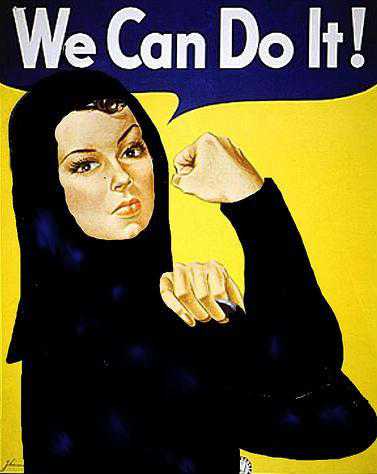By MUSTAFA AKYOL
For Op-Ed, follow @nytopinion and to hear from the editorial page editor, Andrew Rosenthal, follow @andyrNYT.
 FOR years, foreign policy discussions have focused on the question of whether Islam is compatible with democracy. But this is becoming passé. In Tunisia and Egypt, Islamists, who were long perceived as opponents of the democratic system, are now promoting and joyfully participating in it. Even the ultra-Orthodox Salafis now have deputies sitting in the Egyptian Parliament, thanks to the ballots that they, until very recently, denounced as heresy.
FOR years, foreign policy discussions have focused on the question of whether Islam is compatible with democracy. But this is becoming passé. In Tunisia and Egypt, Islamists, who were long perceived as opponents of the democratic system, are now promoting and joyfully participating in it. Even the ultra-Orthodox Salafis now have deputies sitting in the Egyptian Parliament, thanks to the ballots that they, until very recently, denounced as heresy.
For those concerned about extremism in the Middle East, this is good news. It was the exclusion and suppression of Islamists by secular tyrants that originally bred extremism. (Ayman al-Zawahri, Al Qaeda’s leading ideologue, was a veteran of Hosni Mubarak’s torture chambers.) Islamists will become only more moderate when they are not oppressed, and only more pragmatic as they face the responsibility of governing.
But there is another reason for concern: What if elected Islamist parties impose laws that curb individual freedoms — like banning alcohol or executing converts — all with popular support? What if democracy does not serve liberty?
This question is seldom asked in the West, where democracy is often seen as synonymous with liberalism. However, as Fareed Zakaria warned in his 2003 book “The Future of Freedom,” there are illiberal democracies, too, where the majority’s power isn’t checked by constitutional liberalism, and the rights and freedoms of all citizens are not secured. This is a risk for the post-Arab Spring countries, and even for post-Kemalist Turkey. The real debate, therefore, is whether Islam is compatible with liberalism.
The main bone of contention is whether Islamic injunctions are legal or moral categories. When Muslims say Islam commands daily prayers or bans alcohol, are they talking about public obligations that will be enforced by the state or personal ones that will be judged by God?
For those who believe the former, Saudi Arabia might look like the ideal state. Its religious police ensure that every Saudi observes every rule that is deemed Islamic: women are forced to cover themselves, men are forced to frequent the mosque, and everyone is barred from anything considered sinful. Yet members of the Saudi elite are also famous for trips abroad, where they hit wild nightclubs to commit the sins they can’t at home. And while this is their civil right, it raises the question of whether Saudi Arabia’s intense piety is hypocritical.
By contrast, rather than imposing Islamic practices, the ultra-secular Turkish Republic has for decades aggressively discouraged them, going so far as to ban head scarves. Yet Turkish society has remained resolutely religious, thanks to family, tradition, community and religious leaders. Hence in today’s Turkey, where one has the freedom to choose between the bar and the mosque, many choose the latter — based on their own consciences, not the dictates of the state.
Yet even in Turkey, where democracy is rapidly being consolidated under Prime Minister Recep Tayyip Erdogan’s Justice and Development Party, known as A.K.P., there are reasons to worry that illiberal democracy could emerge. For Turkey still suffers from a paranoid nationalism that abhors minority rights, a heavy-handed judiciary designed to protect the state rather than its citizens, and an intolerant political culture that regards any criticism as an attack and sees provocative ideas as criminal.
These obstacles to liberal democracy are unrelated to religion though; they are the legacy of years of secular but authoritarian politics. But the A.K.P., which has been in power for almost a decade and has introduced important liberal reforms, has lately let its progressivism wane. The party has absorbed some of the traditional illiberalism of the establishment in Ankara, the capital, that it now fully dominates. It has not been too Islamic; it is just proving to be too Turkish.
As the A.K.P.’s rule empowers Turkey’s religiously conservative majority, it is imperative that the new elite liberalize the political system, rather than simply co-opt it for their own advantage. And as new questions about religion and public life emerge — Should schools promote Islam? Should alcohol sales be restricted? Should the state instruct private TV channels to uphold “moral values”? — the government must protect civil liberties, including the “freedom to sin,” and constrain those who seek to use state power to impose their values on others.
If Turkey succeeds in that liberal experiment, and drafts its new constitution-in-the-making accordingly, it can set a promising example for Islamist-led governments in Tunisia, Egypt and elsewhere. All of these countries desperately need not only procedural democracy, but also liberalism. And there is an Islamic rationale for it as well: Imposed religiosity leads to hypocrisy. Those who hope to nurture genuine religiosity should first establish liberty.
Mustafa Akyol, a Turkish journalist, is the author of “Islam Without Extremes: A Muslim Case for Liberty.”
via Can Islamists Be Liberals? – NYTimes.com.



